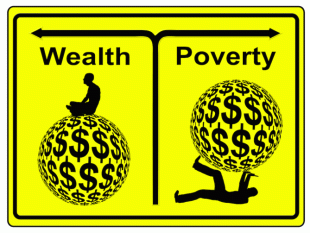| Back OpEd News | |||||||
|
Original Content at https://www.opednews.com/articles/The-Surprising-Reason-that-by-David-Sirota-Elections-And-Campaigns_Inequality_Polling_Poor-141004-71.html (Note: You can view every article as one long page if you sign up as an Advocate Member, or higher). |
|||||||
October 4, 2014
The Surprising Reason that Crushing Economic Inequality Isn't More of Election Issue
By David Sirota
Recent polling from the Pew Research Center found while a large majority of Americans acknowledge the growing gap between rich and poor and see it as a problem, there is little public consensus on the cause of -- or proper counter to -- that trend.
::::::::
Cross-posted from AlterNet

Concept sign of social and economic inequity and the worldwide wealth gap
(Image by sangoiri) Details DMCA
In the report, Harvard University and Chulalongkorn University researchers analyzed survey data from 40 countries about perceptions of pay gaps between rich and poor. In every country, respondents underestimated the size of the gap between CEO and average worker pay. In the United States, for example, the researchers found the median American respondent estimated that the ratio of CEO to worker income is about 30-to-1. In reality, the gap is more than 350-to-1.
The study also found the median American respondent said the ideal pay gap is about 7-to-1 -- a lower ideal than respondents in many industrialized countries. Additionally, no major industrialized country has anywhere close to a 7-to-1 pay gap. That ratio is more than seven times lower than the actual gap in social democratic countries like Denmark and Sweden.
In an interview with the Harvard Business Review, one of the researchers who conducted the study said Americans' inaccurate beliefs about the pay gap may be the reason economic inequality hasn't become more of a political issue.
"The lack of awareness of the gap in CEO to unskilled worker pay -- which in the U.S. people estimate to be 30-to-1 but is in fact 350-to-1 -- likely reduces citizens' desire to take action to decrease that gap," Harvard's Michael Norton said.
Early in the 2014 election cycle, Democrats seemed poised to make economic inequality a central focus of their campaigns, following the high-profile election victories of economic populists like Sen. Elizabeth Warren and New York City Mayor Bill de Blasio.
But as the Washington Post reported, internal Democratic Party polling "found that talking about income inequality does not register strongly with the American public and risks accusations of class warfare." Recent polling from the Pew Research Center found while a large majority of Americans acknowledge the growing gap between rich and poor and see it as a problem, there is little public consensus on the cause of -- or proper counter to -- that trend.
That lack of consensus, coupled with a lack of understanding of the enormity of the pay gap, has complicated Democrats' efforts to make inequality a rallying point. In an interview with the Washington Post, Democratic pollster Geoff Garin said another obstacle is the belief that inequality has no concrete ramifications for voters' daily lives.
"It doesn't have a personal immediacy and there are lot of other things that speak to income inequality that are much more immediate and much more tangible and much more real to people," he told the newspaper.
Recent news events, however, suggest that economic inequality does, indeed, have very tangible consequences.
Strife between police and protestors in Ferguson, Missouri, for example, has spotlighted economic inequality's potential connection to criminal justice. Similarly, Standard & Poor's has released reports showing the widening gap between rich and poor threatens America's overall economic growth and is exacerbating state budget crises. And a study published by the National Bureau of Economic Research finds that America's higher rate of infant mortality than Europe "is driven almost exclusively by excess inequality in the United States."
Despite all this, though, economic inequality remains a peripheral political issue. Why? Based on the data, it is not because the problem is insignificant - it is more likely because Americans' misperceive just how unequal their country has become.
Click Here to Read Whole Article
Authors Bio:
David Sirota is a full-time political journalist, best-selling author and nationally syndicated newspaper columnist living in Denver, Colorado. He blogs for Working Assets and the Denver Post's PoliticsWest website. He is a Senior Editor at In These Times magazine, which in 2006 received the Utne Independent Press Award for political coverage. His 2006 book, Hostile Takeover, was a New York Times bestseller, and is now out in paperback. He has been a guest on, among others, CNN, MSNBC, CNBC and NPR. His writing, which draws on his extensive experience as a progressive political strategist, has appeared in, among others, the New York Times, the Los Angeles Times, the San Francisco Chronicle, the Baltimore Sun, the Nation magazine, the Washington Monthly and the American Prospect. Sirota was a twice-a-week guest on the Al Franken Show. He currently serves in a volunteer capacity as the co-chairperson of the Progressive States Network - a 501c3 nonpartisan organization.
In the years before becoming a full-time writer, Sirota worked as the press secretary for Vermont Independent Congressman Bernard Sanders, the chief spokesman for Democrats on the U.S. House Appropriations Committee, the Director of Strategic Communications for the Center for American Progress, a campaign consultant for Montana Gov. Brian Schweitzer and a media strategist for Connecticut Senate candidate Ned Lamont. He also previously contributed writing to the website of the California Democratic Party. For more on Sirota, see these profiles of him in Newsweek or the Rocky Mountain News. Feel free to email him at lists [at] davidsirota.com Note: this online publication represents Sirota's personal views, and not the official views of the organizations he works with.